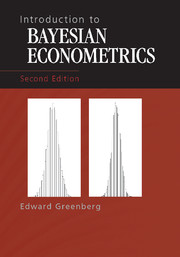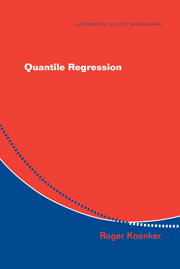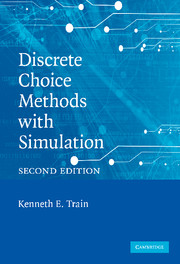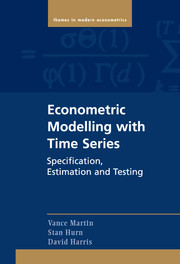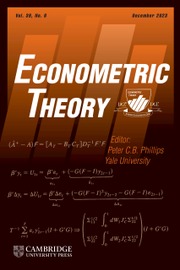Introduction to Bayesian Econometrics
This textbook, now in its second edition, is an introduction to econometrics from the Bayesian viewpoint. It begins with an explanation of the basic ideas of subjective probability and shows how subjective probabilities must obey the usual rules of probability to ensure coherency. It then turns to the definitions of the likelihood function, prior distributions, and posterior distributions. It explains how posterior distributions are the basis for inference and explores their basic properties. The Bernoulli distribution is used as a simple example. Various methods of specifying prior distributions are considered, with special emphasis on subject-matter considerations and exchange ability. The regression model is examined to show how analytical methods may fail in the derivation of marginal posterior distributions, which leads to an explanation of classical and Markov chain Monte Carlo (MCMC) methods of simulation. The latter is proceeded by a brief introduction to Markov chains. The remainder of the book is concerned with applications of the theory to important models that are used in economics, political science, biostatistics, and other applied fields. New to the second edition is a chapter on semiparametric regression and new sections on the ordinal probit, item response, factor analysis, ARCH-GARCH, and stochastic volatility models. The new edition also emphasizes the R programming language, which has become the most widely used environment for Bayesian statistics.
- New chapter on semiparametric regression, new sections on ordinal probit, item response, facto analysis, ARCH-GARCH and stochastic volatility models
- New edition emphasizes the R programming language, the most widely used environment for Bayesian statistics
- Clear, concise explanation of how Bayesian approach arises from basic principles of probability theory emphasizing Markov chain Monte Carlo methods
Reviews & endorsements
'Edward Greenberg's Introduction to Bayesian Econometrics provides clear and concise coverage of Bayesian theory, computational methods, and important applications. Three years of teaching from its first edition convince me that it is a splendid textbook. The second edition is further enhanced by more applications and new guidance on use of free R software.' John P. Burkett, University of Rhode Island
'The apple has not fallen far from the tree, as this second edition of Introduction to Bayesian Econometrics continues in the fine tradition of its predecessor. Along with considerable new material, this second edition contains a thoughtful discussion of important models in time series and financial econometrics (including ARCH/GARCH and stochastic volatility models), as well as an introduction to flexible Bayesian techniques for distribution and regression function modeling. Throughout the text Greenberg engages the reader with an accessible writing style, real data applications, and references to the R programming language. There is much to be learned within these pages. Students and researchers in statistics, biostatistics, economics, and the social sciences will find this to be a tremendously valuable resource.' Justin Tobias, Purdue University
Review of the first edition: 'Professor Greenberg has assembled a tremendously valuable resource for anyone who wants to learn more about the Bayesian world. The book begins at an introductory level that should be accessible to a wide range of readers and then builds on these fundamental ideas to help the reader develop an in-depth understanding of modern Bayesian econometrics. The explanations are very clearly written, and the content is supported with many detailed examples and real-data applications.' Douglas J. Miller, University of Missouri, Columbia
Review of the first edition: 'This concise textbook covers the theoretical underpinnings of econometrics, the MCMC algorithm, and a large number of important econometric applications in an accessible yet rigorous manner. I highly recommend Greenberg's book as a PhD-level textbook and as a source of reference for researchers entering the field.' Rainer Winkelmann, University of Zurich
Review of the first edition: 'This book provides an excellent introduction to Bayesian econometrics and statistics with many references to the recent literature that will be very helpful for students and others who have a strong background in calculus.' Arnold Zellner, University of Chicago
Product details
August 2014Paperback
9781107436770
270 pages
254 × 178 × 14 mm
0.47kg
29 b/w illus. 19 tables
Available
Table of Contents
- Part I. Fundamentals of Bayesian Inference:
- 1. Introduction
- 2. Basic concepts of probability and inference
- 3. Posterior distributions and inference
- 4. Prior distributions
- Part II. Simulation:
- 5. Classical simulation
- 6. Basics of Markov chains
- 7. Simulation by MCMC methods
- Part III. Applications:
- 8. Linear regression and extensions
- 9. Semiparametric regression
- 10. Multivariate responses
- 11. Time series
- 12. Endogenous covariates and sample selection
- A. Probability distributions and matrix theorems
- B. Computer programs for MCMC calculations.

